By Libya Herald reporter.

13 February 2016:
Hopes of creating a national unity government by Monday were in disarray today as deputy prime . . .[restrict]minister-designate Fathi Majbri followed Ali Gatrani in again walking out of Presidency Council discussions, prime minister-designate Faiez Serraj cancelled his departure to the Munich Security Conference, and a number of members of the Libya Dialogue left Skhirat, deciding there was no point staying.
The House of Representatives is also reported to have abandoned its Monday meeting to debate the new government, reckoning that there was no chance of the Council now coming up with a list of ministers in time.
Majbri, who is since reported to have been persuaded to return, complained that Cyrenaica was not getting its fair share of top ministries. It was only getting defence, he said, accusing the west and south of the country of scheming to “marginalise and stifle Cyrenaica”, as he put it in a statement. It should get at least one other of the top five ministries, he said, these being interior, foreign affairs, economy and local government.
The other deputy PM-designate from the east, Gatrani, had already walked out of the Presidency Council, his third such departure, claiming that any government that emerged from the Council would be dead at birth, that there was no unity at all among the Council members and that it needed to be reduced to just three members, not nine.
Majberi and Gatrani represent to two main but divergent political tendencies in the east – respectively the federalists and those backing the Libyan army. Together they represent the majority of eastern public opinion, and without them there is little chance of any proposed government obtaining a majority in the House of Representatives.
Reports that Majbri had decided to return came too late to prevent Serraj abandoning his visit to Munich where he was supposed to meet with House of Representatives President Ageela Salah together with US Secretary of State John Kerry and EU foreign policy chief Federica Mogherini. Various members of the Libya Dialogue who were in Skhirat trying to help the Council surmount its divisions and choose a government meanwhile took the opposite view and decided that there was nothing further to be done at this point.
The lack of unity within the Presidency Council is increasingly raising questions among Libyans and international observers as to whether the proposed system is fatally flawed and will have to go. “How can it [the Council] unite the country when it is not united itself?” the head of one of Libya’s state institutions said to this newspaper yesterday. [/restrict]









